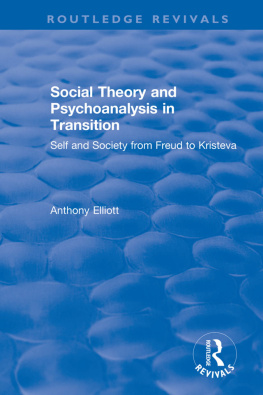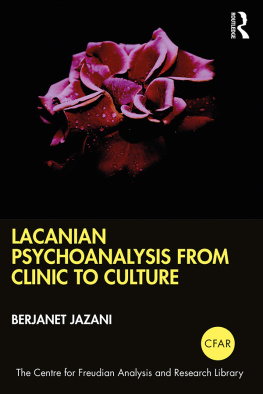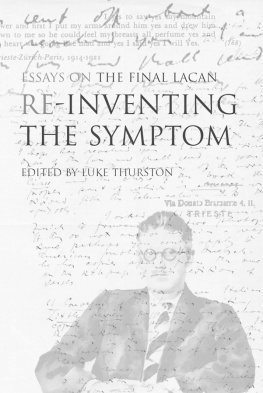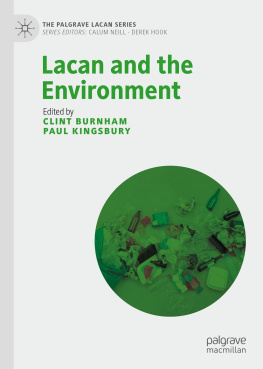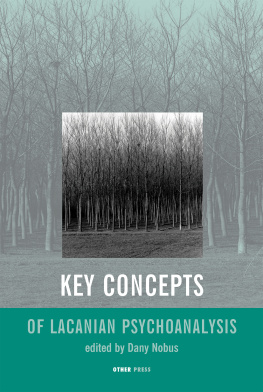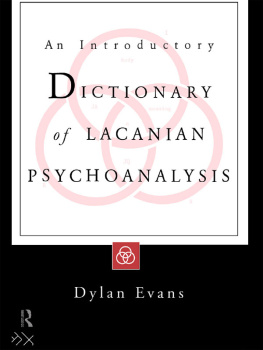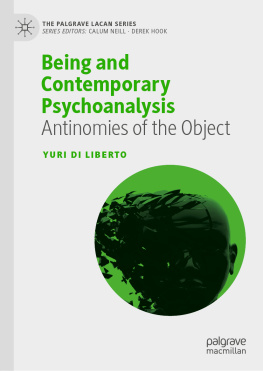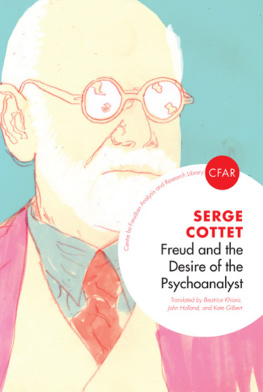
T H E D E S I R E O F P S Y C H O A N A L Y S I S

Series Editors
Slavoj iek
Adrian Johnston
Todd McGowan
diaeresis
T H E D E S I R E O F
P S Y C H O A N A LY S I S
Exercises in Lacanian Thinking
Gabriel Tupinamb
Northwestern University Press
Evanston, Illinois
Northwestern University Press
www .nupress .northwestern .edu
Copyright 2021 by Northwestern University Press.
Published 2021. All rights reserved.
Printed in the United States of America
10 9 8 7 6 5 4 3 2 1
Library of Congress Cataloging- in- Publication Data Names: Tupinamb, Gabriel, author. | iek, Slavoj, writer of foreword.
Title: The desire of psychoanalysis : exercises in Lacanian thinking / Gabriel Tupinamb ; [foreword by Slavoj iek].
Other titles: Diaeresis.
Description: Evanston, Illinois : Northwestern University Press, 2021. | Series: Diaeresis | Includes bibliographical references and index.
Identifiers: LCCN 2020036848 | ISBN 9780810142817 (paperback) |
ISBN 9780810142824 (cloth) | ISBN 9780810142831 (ebook) Subjects: LCSH: Lacan, Jacques, 1901 1981. | Psychoanalysis.
Classification: LCC BF173 .T843 2021 | DDC 150.195 dc23
LC record available at https://lccn.loc.gov/2020036848
To Luisa:
... only there may the signification of an infinite love emerge
Contents
Acknowledgments ix
Foreword
For Lacan, against Lacanian Ideology, by Slavoj iek xi
Introduction 3
Psychoanalysis and Politics after 2017
The Basis of Lacanian Ideology
The History of an Impasse in Lacanian Thinking
The Generic Perspective in Psychoanalysis
The Political Economy of Clinical Practice
The Form of the Other and Its Institutional Enclosure 120
Groundwork for a Metapsychology of Ideas
The Idea of the Passe 176
Conclusion
Notes 229
Works Cited
Index 259
Acknowledgments
I cannot say that the ideas in this book are really mine: they gradually formed and sedimented while I was entertained having long discussions with friends, usually about other things. To thank all of these generous interlocutors would be impossible, so I would like to name just a few of them, in the hope that everyone else with whom I share similar bonds might feel equally recognized: Clara Tupinamb, Yuan Yao, Srdjan Cvjeticanin, Agon Hamza, Cindy Zeiher, Daniel Tutt, Jeniffer Bello, Rodrigo Gonsalves, Jean- Pierre Caron, and Reza Naderi. At the same time, I would never have realized the importance of what emerged in our conversations if it were not for some insistent problems that troubled me for years, and which endowed these ideas with their relevance. These are impasses that I learned to face and endure, rather than merely avoid, only because I was not alone. For this, I would like to thank those who sought analysis with meand those with whom I sought my own analysisas well as my comrades in the Circle of Studies of Idea and Ideologyamong them, my dear and departed friend Fernando Fagundes Ribeiro. I would also like to thank Slavoj iek and Alenka Zupani, both of whom paved the way for much of what is written here.
Finally, without the support of my familyand, especially, without Luisa in my lifeI would never have had the courage to engage with this ambitious project, much less the serenity to recognize how little of it I can actually take credit for.
ix
Foreword
For Lacan, against
Lacanian Ideology
Slavoj iek
Gabriel Tupinambs The Desire of Psychoanalysis is a pathbreaking master-piece: it is a surprise, but the effect of surprise comes from the fact that it brings out things which have been hanging in the air for a long time.
With it, the ideological game that predominated in Lacanian circles is spoiled, a certain innocence is forever lost.
The book affected me profoundly at two levels which are inter-linked but nonetheless different. One is its precise analysis of the inconsistencies of what Tupinamb calls Lacanian ideology: a whole series of limitations which prevented Lacan from fully deploying the potentials of his own theoretical breakthroughs. The other is a whole bundle of rather nightmarish specters from my own past involvement in the Lacanian movement that it brought out in me. While Tupinambs conceptual analyses deserve a detailed elaboration for which there is no place here, Ill limit myself to a brief evocation of specters that still haunt me.
The source of the difficulties the Lacanian movement got caught in is Lacanian ideology: a double move, described by Tupinamb, of (1) conferring on the analysts a radical epistemological privilege: due to its roots in a unique clinical constellation, psychoanalysis can see the
constitutive lack or blindness of science (which forecloses the subject), of philosophy (which is ultimately a Weltanschauung covering up the crack of impossibility), and politics (which remains constrained to the domain of imaginary and symbolic identifications and group formations); and simultaneously of (2) silently cutting off psychoanalytic theory from its specific roots in the clinical setting, and ideologically elevating it to a universal status that is by definition wiser than all other discourses (the logic of the signifier or the theory of discourses de facto became a new ontology). The exemplary case of this double move is Jacques- Alain Millers politicization of psychoanalysis in his political movement Zadig, where a liberal- democratic choice is directly legitimized in Lacanian terms. Tupinamb mercilessly explores the roots of this ideology in Lacan himself.
xi
xii
F O R E W O R D
Does not Tupinamb do for Lacan what, at the end of his book, he so admirably describes as the concluding moments of the analytic treatment: traversing the fantasy, plus naming and narrating in the testimony the non- symbolizable obstacle which sustained the transference? He enables us to get rid of our transference on Lacan by way of nominating Lacans fatal limitation: we are no longer caught in the endless process of grasping the ultimate mystery of Lacan, and we get the formula of how Lacan constructed the very space in which this elusive excess emerges.
As a counterpoint to these deviations, Tupinamb deploys the idea of the analytic community as a trans- clinical space in which the goal is not just to cure individuals but to expand the frame of analytic theory itself, up to questioning its basic presuppositions. While fully endorsing this goal, I think it brings traps of its own (of which Tupinamb is well aware). Sympathetically democratic though it may appear, the practice of Sandor Ferenczi (who, according to some witness reports, sometimes interrupted his patient in the middle of the latters flow of free associations, took his place on the divan, and began to pour out his own associations) confronts us with the transferential subordination of analysands to analysts which remains in full force in Lacanian societies. In these bodies, we have not only those who are only analysts and those who are only analysands but also a crucial third category, something like foot soldier analysts: analysts (receiving patients of their own) who are simultaneously in analysis with the higher analysts (who are themselves no longer in analysis). I even knew a couple of cases of analysts who found themselves in a really difficult predicament: they were in an endless analysis with a
pure analyst (quite often for the simple reason of safeguarding their status in the analytic community, since ending their analysis could entail the rage of the pure analyst who was their de facto master), and they sometimes worked themselves as analysts just to earn money to pay for their own analysis.
Next page

